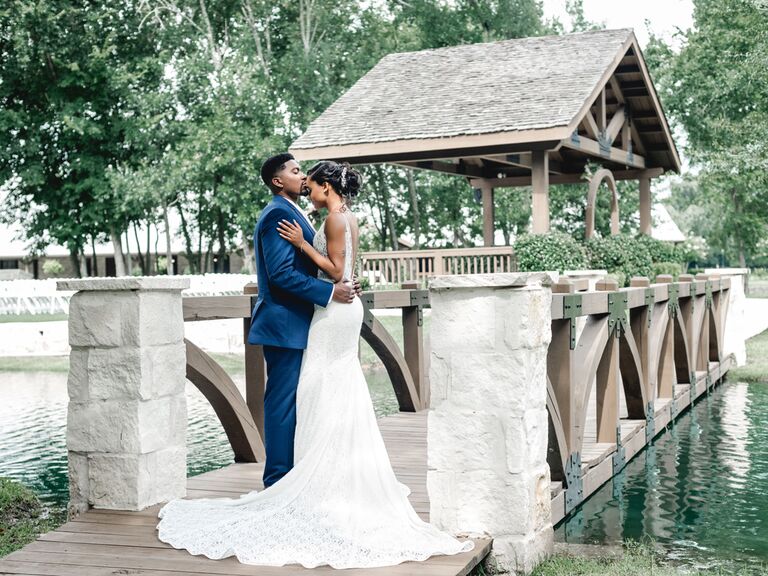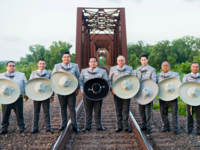How to Get Married in Texas and Plan Your Wedding
Engaged and want to learn how to get married in Texas? Whether you're a local or just love the region, the Lone Star State is a beautiful place to exchange vows and start the next part of your life together. As the second largest state in the country, Texas has a diverse number of locations that can perfectly fit your wedding vision. Dallas-based wedding planner KC Cloud notes, "Texas weddings are full of charm and personality, but planning one comes with its own unique twists."
Ahead, learn the ins and outs of getting married in Texas, from obtaining a marriage license to selecting your perfect venue.
In this article:
- How to Get a Marriage License in Texas
- Notable Wedding Locations in Texas
- How to Plan a Wedding in Texas Step-by-Step
How to Get a Marriage License in Texas
Before hosting a wedding, it's important to make sure you can legally get married in the Lone Star State. "Getting a marriage license in Texas is simple," Cloud shares. "Both parties must appear in person at a county clerk's office with valid photo ID (like a driver's license or passport) or a certified birth certificate. You'll also need to provide your Social Security number if you have one." In addition to your documents, you will need to pay a fee. "The fee ranges from $60–$85, but you can save up to $60 by completing a state-approved premarital course," Cloud says.
Texas wedding requirements are pretty easy to fulfill as well. "Marriage licenses are valid for 90 days and don't require blood tests or residency," the planner shares. She notes to give yourself enough time between obtaining your license and tying the knot. "While Texas has a 72-hour waiting period, exceptions apply for military members, court waivers or those who complete state-approved premarital counseling."
Notable Wedding Locations in Texas
Don't worry about finding great Texas wedding venues. Cloud shares, "[The state] offers gorgeous venues and plenty of local charm to turn your wedding into a mini-vacation for guests."
Dallas
The beautiful city of Dallas is a prime location for a big Texas wedding. While there is a diverse array of venues available, Cloud particularly loves the Rosewood Mansion on Turtle Creek and the Dallas Arboretum for celebrations.
Hill Country
The area of Texas encompassing the cities of Austin, San Antonio and Fredericksburg is a favorite for couples who want to tie the knot. "Some of my favorite venues include Contigo Ranch in Fredericksburg and The Driskill in Austin," Cloud notes.
Houston
The large city of Houston offers a number of dynamic, beautiful venues for your marriage in Texas. Those who want to wed in Space City can find outdoor options like the Houston Arboretum, elegant manors like The Springs in Cypress and historic venues such as The Parador.
Fort Worth
Fort Worth in Northern Texas is a vibrant city with a wide variety of destinations from cultural institutions to rodeos. As for wedding venues, Cloud suggests checking out places like the Modern Art Museum and the luxe Auberge hotel, Bowie House.
Galveston
Want a coastal wedding? You can get a seaside celebration by hosting your wedding in Galveston. Choose large hotel venues like Grand Galvez or guarantee water views at the Bayside Event Center.
How to Plan a Wedding in Texas Step-by-Step
Now that you know about some of the best places to get married in the state, it's time to plan your wedding. Read ahead for tips and Texas wedding ideas you should know.
1. Set a Budget
One of the first steps to get married in Texas should always be creating a budget. Until you have this point of reference for your planning, you won't have a proper idea of what kind of venue, vendors and guest count you can afford. Since every state is different, check out The Knot Budget Advisor to get a better idea of what wedding costs look like in Texas.
2. Select a Time of Year
"Texas has a longer than average wedding season, with spring (March to May) and fall (October to November) being the most popular times," Cloud explains. "Book venues and vendors early—especially if you're planning during these peak months. First, let's talk weather—it's unpredictable! Summer heat calls for shade and hydration, spring brings rain (hello, backup plan) and winter evenings can get chilly, so think ahead."
3. Choose a Venue
"Texas is a huge state offering a variety of venues to choose from," Cloud says. "Before choosing a venue, I highly suggest sitting down and thinking about what vision you have for your wedding and nailing down a guest count. From art museums to rustic barns to grand estates, there is a venue for everyone available in our great state."
4. Book Your Vendors
Not only do you need a venue, but you also need a top-notch team to execute your wedding day from a planner to caterers. To get started on your search, check out The Knot Vendor Marketplace to find local professionals who fit your budget and vision.
5. Add Texas Charm
"Want to give your guests a true Texas experience? Incorporate local flavors like BBQ, Tex-Mex or a late-night kolache bar, and surprise them with welcome bags filled with Texas treats like pecan pralines or mini hot sauces," Cloud suggests. "Whether you're drawn to the rolling vineyards of Hill Country, the chic city vibes of Austin or Dallas or the desert beauty of Marfa, the state's diverse backdrops never disappoint." She adds, "And because this is Texas, don't be afraid to go big—grand florals, live music or even a firework send-off. After all, everything's bigger (and better) here!"
6. Send Your Invitations
Now it's time to have other people join the party. Once you solidify your guest list, make sure to send save-the-dates and, later, invitations out to your guests. Just make sure you have a good amount of lead time so you can properly account for RSVPs.
























